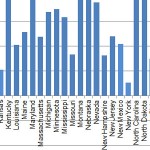Fairness at the Sales Tax Hearing
At yesterday’s hearing of the Rhode Island House Finance Committee (which started with four members in attendance and reached a maximum of eight of the fifteen during the three hour meeting), the RI Center for Freedom & Prosperity presented its findings with respect to legislation that would eliminate the state sales tax, submitted by Representative Jan Malik (D, Warren, Barrington). Video of the hearing is available here.
Rep. Larry Valencia (D, Exeter, Hopkinton, Richmond) initiated an interesting exchange around the 86:15 mark on the video:
Valencia: Philosophically, what I’m coming across when I take a look at all these documents is that you feel that the income tax is a fairer way to redistribute income, and that the sales tax is immoral and should be eliminated entirely.
Without transcribing all of the responses (mainly with the message of “not at all”), the panel found the question somewhat difficult to answer mainly because none of us really view taxation from that perspective. Fairness isn’t an economic variable, and even if it were an appropriate way to frame tax policy, the complications would make it impossible to achieve.
In the progressive view, people with more money can afford to pay more for the services that we all use, so it’s only “fair” that they do so. Often embedded within that view is the further assumption that they are wealthier because they’ve benefited more from the system, not because they’ve put in any more effort or taken any more risk for the public good than other people have.
Once one starts imagining actual people, though, “fairness” muddies. Firstly, we don’t all use (or want to use) government services equally. A healthy, childless person making a fortune working from home (with a septic system and well water) in some far corner of the state hardly uses any government services at all.
Secondly, whatever one’s views on what it takes to have a high income, not having a high income is not proof of purity. Is it fair that somebody who games the system his or her entire life rarely pays into it?
Thirdly, the earning of income creates divisions of “fairness.” Is it fair that somebody living off a previous generation’s wealth pays less than somebody whose work, benefiting the economy through his or her expenditure of effort and talent, earns a lot of money each year? Or is it fair that somebody who lives on peanut butter sandwiches for years while working 100-hour weeks to build a business, perfect an invention, or develop a craft (in or out of college) should be whacked with inordinate taxes the moment he or she begins to profit from those sacrifices?
The larger, more-important point, though, is that the entire premise of taxation as a way to “redistribute income” is dead wrong because it is, itself, immoral and because it creates a system of incentives that practically ensures unfair abuse of government power.
The government requires revenue to function. The difficulty is that every tax creates incentives in all directions, and the principle is that a tax should in some way be traceable to the value that government adds.
An income tax creates incentive for the government to help its constituents increase income. However, it creates disincentive for people to work to get that income, and it isn’t at all clear (to put it mildly) what the government can actively do within its appropriate bounds to accomplish what it has incentive to accomplish.
A sales tax creates incentive for the government to make it easy to spend money on things that are taxable, as well as to find the money for that purpose. However, it creates a disincentive (particularly at the state and local levels) to spend money where doing so is taxable. And moreover, in the “what government can do” column, the incentives are for government to redistribute money to people who will spend it in a taxable way, as well as for them to get it on their own, including by increasing their debt.
On these grounds, the property tax appears in the best light. The government’s incentive is to make property more valuable. Of course, that creates the corresponding disincentive for people to improve their property, although the incentive to live in more attractive surroundings is naturally pretty strong.
Most important, though, is that improving the area in which you own your property is thoroughly within the scope of government, with infrastructure, security, and other things that we consider basic government functions. As a bonus, property taxes are more obviously the purview of local government, so to the extent that the system is property-tax-driven, government authority will move closer to the local level, where it is more immediately accountable to the people.
I offer this mainly as an example of how tax decisions ought to begin on a philosophical level. A particular state’s circumstances may make the difference, whatever the principle. A small state with wealthy neighbors, for example, should consider how tax structure affects consumer behavior.
To the extent that fairness and morality come into it, perhaps the measure should be how well we resist ideological calls and formulate an intelligent policy.



